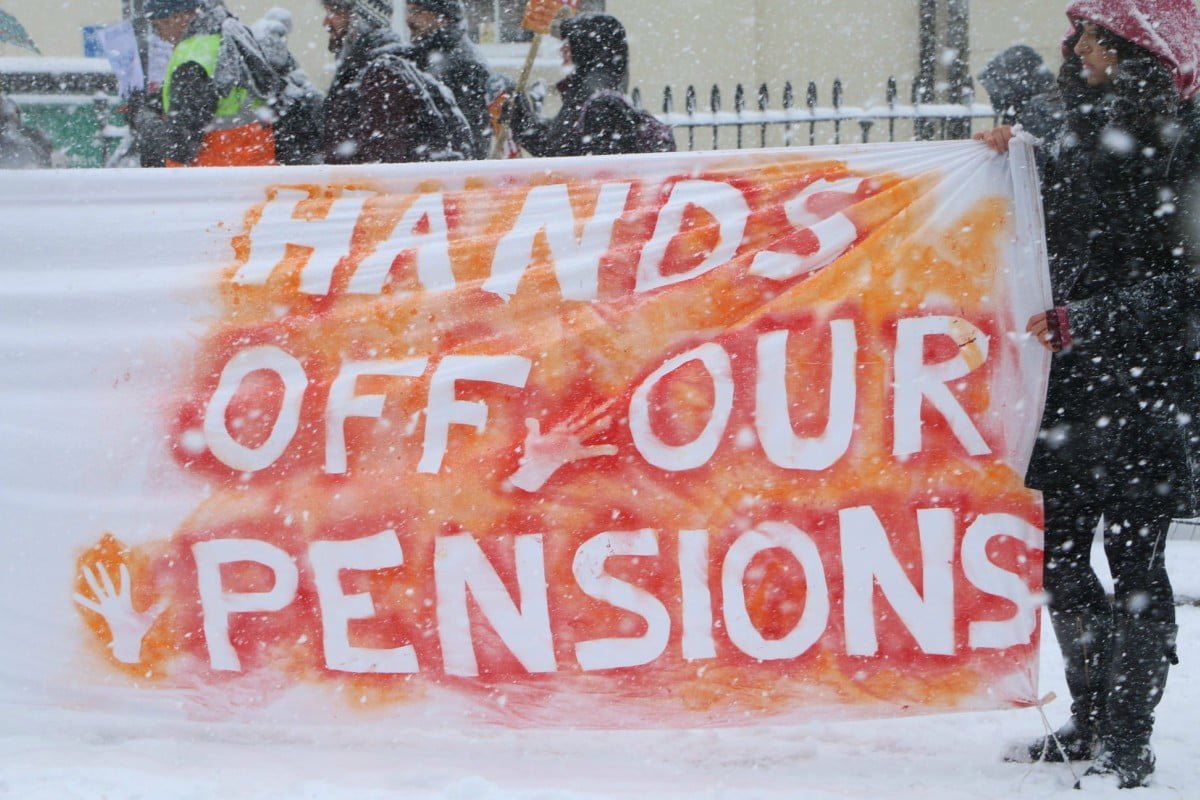One week in, the strikes by lecturers and academic staff in universities across the country are holding strong. The bosses are on the back foot, and there is a sense that victory is within sight.
Members of the University and Colleges Union (UCU) in universities have been on strike for a week now. The strikes resume next Monday, with four days action next week, and a further five days planned for the week after.
Universities UK, the organisation for university bosses, is already beginning to retreat. After initially saying there could be no concessions, they have now stated that they are open to further negotiations with the UCU.
Enthused by the strong showing on the picket lines, there is a real sense amongst those on strike that victory is possible in this struggle.
The support and solidarity offered by students has been pivotal. Marxist societies across the country have been helping on the picket lines. Student unions are voting to support the strike. And students are going into occupation in solidarity with their lecturers, as part of a united fight against attacks on education.
We provide here a series of articles and reports on the latest developments surrounding the UCU strikes. Follow the Marxist Student Federation website, Facebook, and Twitter for daily updates on the strike.
Staff and students unite and fight against attacks on higher education
By Joe Attard, King’s College London UCU (personal capacity)
University picket lines up-and-down the country have drawn huge crowds, as thousands of students brave blizzards to show their solidarity with striking lecturers. This is by far the biggest and most successful action the UCU has ever taken. The task now is to transform this radical energy into a movement for fundamental social change.
The UCU called 14 days of strike action over a proposed attack on pensions by the university bosses’ organisation, Universities UK. The proposal is to shunt lecturers from the present, defined benefit, Universities Superannuation Scheme (USS), onto a defined contributions scheme that would see pensions pay out in response to the performance of the stock market.
Given the current volatility of the markets, it is estimated this could cost lecturers up to 40 percent of their pensions. This will hurt starting academics (casualised teaching assistants and teaching fellows for instance) the most. It is the latest in a series of capitalist attacks on the young.
Solidarity and support
The bosses did not bank on the enormous response from lecturers and students, however. Despite trying to pit students against staff by highlighting the ‘consumer cost’ to students, in terms of lost teaching and potential disruption to final exams, most students have sided with their teachers.
A recent survey by the Times Higher Education Supplement found that most students support the strike and are directing their anger towards the Universities UK rather than the UCU. The National Union of Students (NUS) has also released a statement of solidarity with striking lecturers. Many local student unions have overwhelmingly passed motions of solidarity with striking academics.
The fact that most students are sympathetic towards the strike should come as no surprise. Over the past few decades, students have seen the introduction (and tripling) of student fees, resulting in eye-watering levels of debt. Combined with rent hikes for student accommodation, cuts to bursaries, and anxiety over increasingly miserable graduate employment prospects, young people in education have been made to bear the brunt of the crisis of capitalism.
Casualisation and cannibalisation
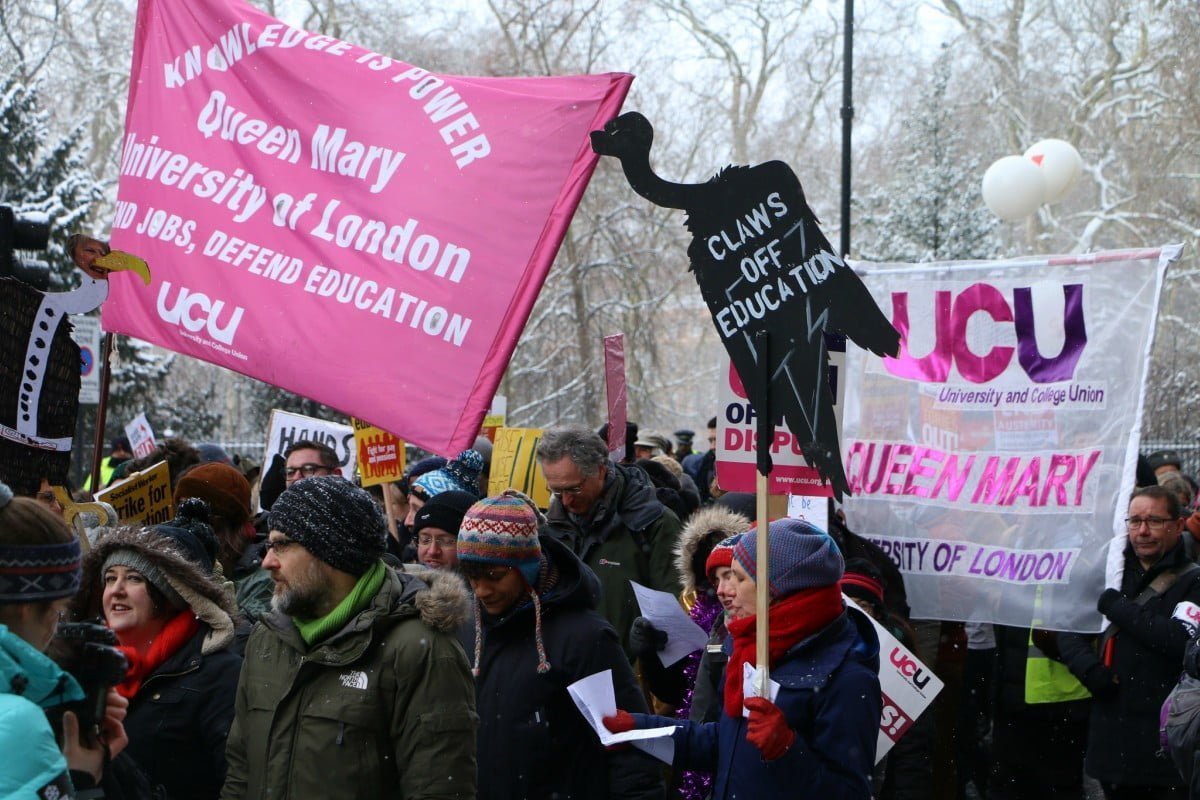 With world markets largely exhausted, and especially following the 2008 financial crisis, the capitalists have been cannibalising public services like healthcare and education through privatisation and marketisation.
With world markets largely exhausted, and especially following the 2008 financial crisis, the capitalists have been cannibalising public services like healthcare and education through privatisation and marketisation.
From the point of view of university workers, this has resulted in historic levels of casualisation. Over 60 percent of the academic workforce is on one or another form of precarious contract. Many academics, with years of teaching experience and prestigious publications to their names, are being forced to supplement fixed-term teaching income with odd jobs. The prospect of a full-time contract has become ever-more remote. Many lecturers are forced to live with their parents long into their 30s.
The new attack on pensions is intimately connected to the organic crisis of capitalism. The UUK’s justification for the change to a defined contributions scheme is a £6bn projected hole in the existing pension scheme. This hole stems from the historically low yields of UK government bonds, which in turn results from the quantitative easing that dragged capitalism out of the 2008 recession.
Now the bosses are expecting ordinary lecturers to shoulder more of the risk contained in the pension scheme. Meanwhile, they continue to reward themselves with six-figure salaries. Their attack on pensions is nothing more than cloaked austerity.
Bosses on the back foot
But the bosses did not bargain for such widespread unity against the counter-reform to pensions. Marxist students have led a number of interventions at huge pickets all over the country, drawing in hundreds of students and staff.
Picketers have been organising ‘teach-outs’ and political discussions, which have attracted high-profile speakers from the labour movement. Jeremy Corbyn has issued a statement of solidarity with the UCU, while John McDonnell (speaking at Goldsmiths) said that the strike must become a movement to “bring down” the faltering Tory government.
This is absolutely correct. In the short term, this disgraceful and hypocritical counter-reform by the UUK must be resisted. There are already indications that the bosses will buckle.
During the first week of striking, a group of students occupied the UUK offices in Tavistock Square, London, in protest at the pension counter-reform. This week a huge crowd again descended on their headquarters demanding their commit to meaningful negotiation.
The pressure is taking its toll. 15 vice-chancellors have already advocated a return to negotiations, and the UUK have declared themselves willing to “rethink” their proposal. They have also agreed to further negotiations with the UCU, but on the utterly bizarre ‘precondition’ that these talks cannot discuss the proposed pension cut.
Deal a deadly blow
University workers and students will never be safe from exploitation for as long as universities are run as profit-generating machines under the control of parasitic vice-chancellors. The task now is to harness the radical energy displayed on picket lines across Britain; to link up with workers from the rest of the public sector to deliver a deadly blow to Theresa May’s decrepit administration.
The weakness of May’s government is evidenced by their tepid stance on the pension reform. For example, Tory universities minister Sam Gyimah called on the UUK to accept “talks without preconditions”. Meanwhile, Theresa May has attacked university vice-chancellors for their enormous pay packages.
Rest assured, this does not mean the Tories have been moved to declare sympathy with striking lecturers. Rather, they are in a desperately weakened position following their disastrous performance at the last general election, which cost them their parliamentary majority.
Their position has been eroded further by a number of subsequent debacles – including, most recently, an attempt to smear Jeremy Corbyn as a communist spy! The enfeebled parliamentary wing of the ruling class lacks the confidence to back their capitalist cronies over this issue, given the firm pushback from workers and students.
The Tories should be spared no mercy: they and their friends in the UUK are responsible for this mess.
From here, the UCU should join in struggle with other public sector unions and mobilise for a general opposition to privatisation and marketisation of public services. The union should also reach out to students by framing this dispute as part of a wider fightback against the commodification of education, and a struggle for free education, provided on the basis of a democratic, socialist society.
The NUS, for its part, should take advantage of huge student support for lecturers and bring its membership out onto the streets to keep fighting until this vision is achieved. The Labour Party should build upon the support it has shown and give political leadership to this movement – putting into practice Corbyn’s promise for free, cradle-to-grave education for all.
Let victory for lecturers and students be the death knell for the Tories.
Thousands march in London to defend education
By London Marxist students
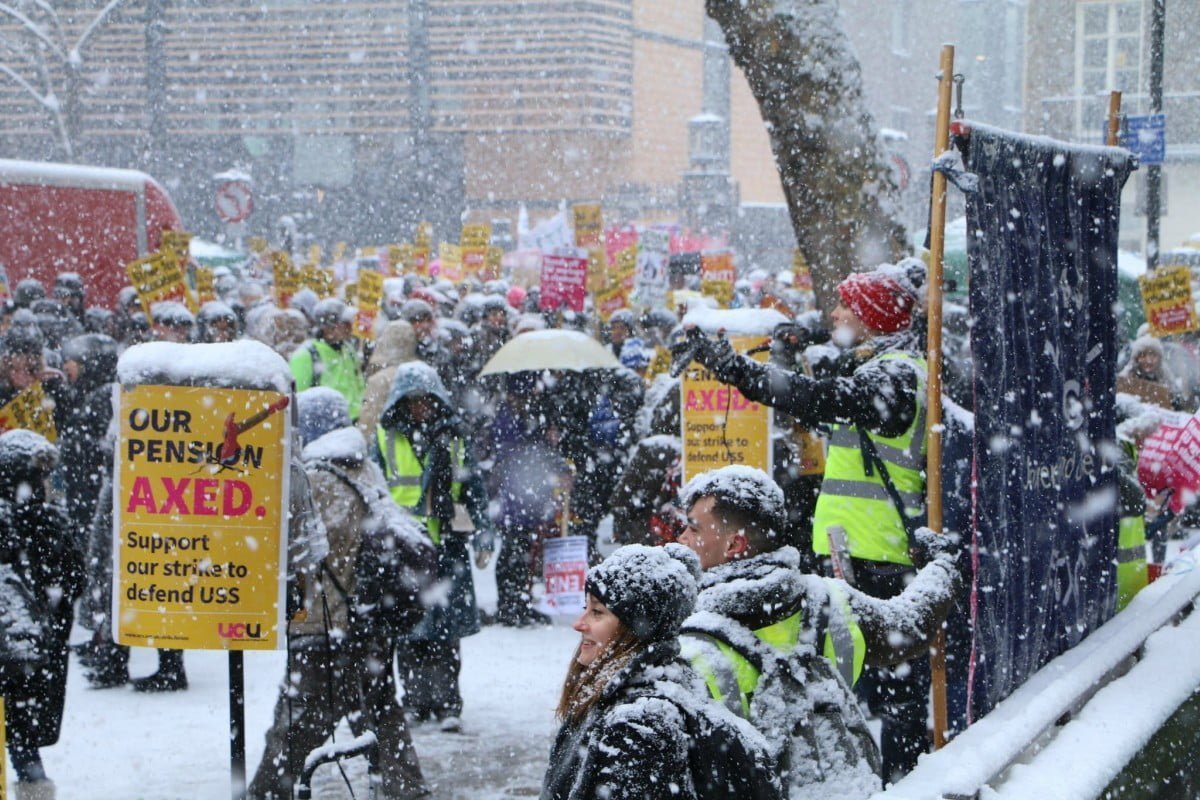 Thousands of university workers and students braved blizzard conditions in central London on yesterday (Wednesday 28 February) in order to demonstrate in defence of higher education.
Thousands of university workers and students braved blizzard conditions in central London on yesterday (Wednesday 28 February) in order to demonstrate in defence of higher education.
Members of the University and College Union (UCU) from all across London and beyond gathered as temperatures plunged and the snow fell, joined by students and comrades from further education colleges.
The protest provided a militant marker for a strong week of strike action by the UCU, which represents university lecturers, academics, and some support staff.
As our various reports from the picket lines have shown, this strike is the largest and strongest action seen in higher education for years. UCU members are clearly determined to defend their pensions against the proposed changes, having already seen pay cuts and attacks on their terms and conditions over the last decade.
Importantly, students have instinctively drawn the links between the UCU action in defence of pensions and the movement against fees and cuts. It is evident to all that the attacks on academics’ pensions are part-and-parcel of the same general attacks on universities – and on public services in general.
As a result, large numbers of students have been offering their support and solidarity to their lecturers. This solidarity was clearly on display at the education demo in London, with many students skipping classes to join their striking lecturers at the protest.
Yesterday was aslo the first day of strike action by UCU members in further education, who are striking over cuts to pay. Several UCU branches from FE colleges were also present at the protest, with speakers from the platform highlighting the attacks on FE that have been seen in recent years.
The demonstration culminated with a rally in Westminster, where a number of big name speakers gave their support to the strike. This included John McDonnell, the Labour MP and shadow chancellor.
The Labour Party’s explicit support for this strike is important. Combined struggle on the industrial and political fronts is essential if we are to win. Ultimately this needs to be a fight against education cuts, against attacks on workers, and against the entire capitalist system that demands austerity.
Despite the sub-zero temperatures, the atmosphere on the march was positive and enthusiastic. This reflects the general mood amongst those on strike, who can sense the potential to win this battle.
University bosses have begun to budge on the possibility of concessions. The picket lines have grown over the week in some cases, bolstered by student support. And with nine days of action ahead still planned, UCU members are in a strong position to carry on pushing forward to victory.
HE Unison members on USS balloted for strike action
By UEA Marxists
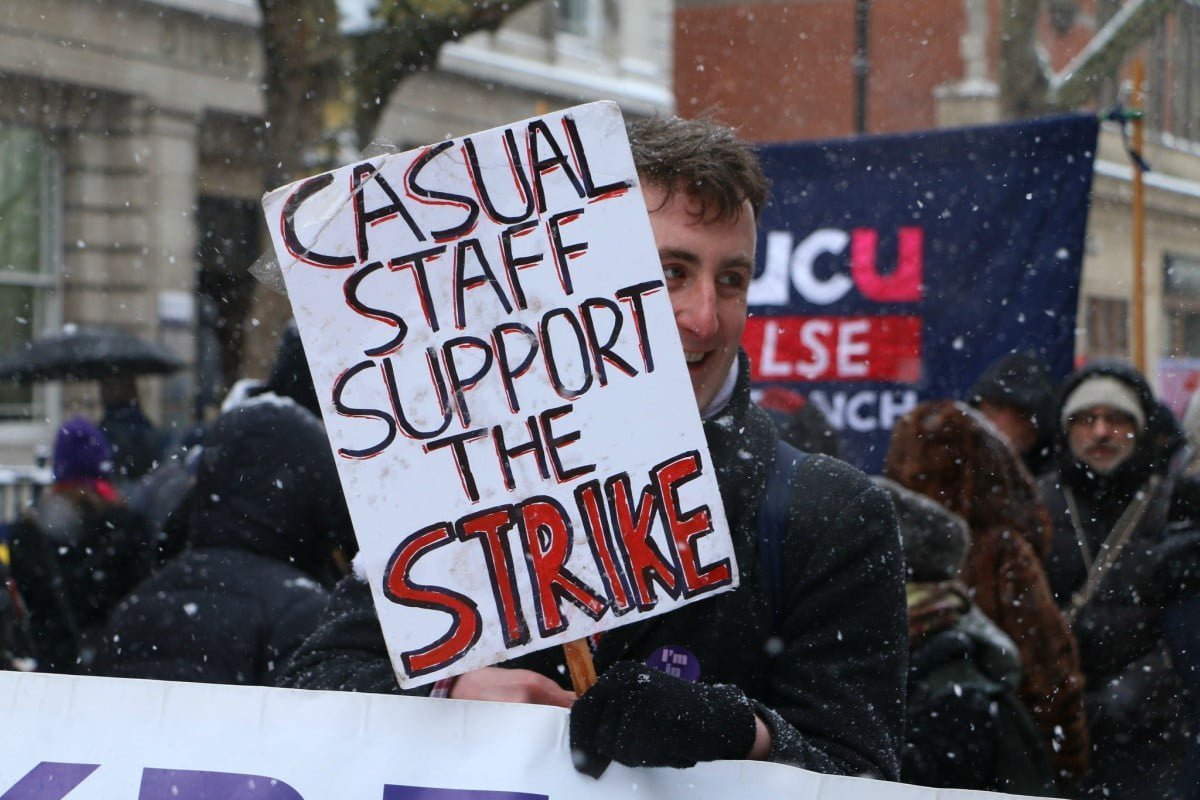 Unison have now balloted members in Higher Education who are part of the USS pension scheme for strike action over the proposed changes to the scheme. This is the same reason why UCU members are currently taking strike action at universities around the country.
Unison have now balloted members in Higher Education who are part of the USS pension scheme for strike action over the proposed changes to the scheme. This is the same reason why UCU members are currently taking strike action at universities around the country.
Unison actually began a consultation over the proposed changes to the USS pension scheme on 13 February, and the consultation was due to run until 2 March. According to one member at the University of East Anglia (UEA) the consultation email wasn’t sent out until two days ago, suggesting that Unison’s leadership have been dragging their feet a little bit over this issue.
Under pressure from the enormous show of strength by UCU in opposition to the pension scheme, and due to the strong desire among Unison members to support their UCU colleagues in actions, not just words, Unison balloted its members for strike action yesterday.
John, a university worker and Unison member whose pension is in the USS scheme said that he had voted for strike action. He is confident that Unison members will vote for strike action and that they’ll be out on strike alongside the UCU members very soon.
Broadening out the struggle to involve unity among workers from different unions is the best strategy for winning this fight. Ultimately, to guarantee decent living and working conditions for everyone in our society, we’ll need unity in action across all unions and sectors of the working class. Historically this has been the role of the general strike.
The battle over pensions is a vital one to win. It’s key to the general struggle against capitalism and the fight to guarantee workers’ rights far into the future.
Southampton students occupy in solidarity with strike
By Simon Anderson, Soton Marxists
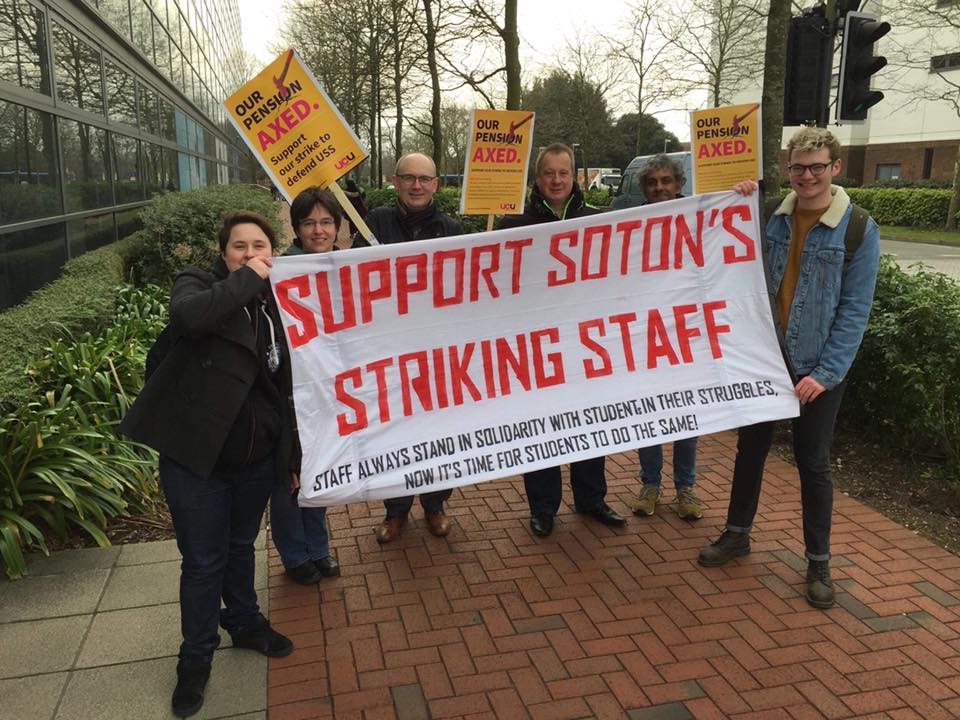 At Southampton we have witnessed attacks by the Vice-Chancellor on our education since he arrived three years ago. He first attacked the support staff at halls accommodation, and then cleaners and security. Most recently, in November, he announced cuts to lecturers and a restructuring of the university.
At Southampton we have witnessed attacks by the Vice-Chancellor on our education since he arrived three years ago. He first attacked the support staff at halls accommodation, and then cleaners and security. Most recently, in November, he announced cuts to lecturers and a restructuring of the university.
In response to the lecturer cuts, we created the Southampton Students Against University Cuts (SSAUG) group. Using this and the Marxist society we made links with all the unions on campus (UCU, Unison, Unite). This is how we have been supporting our staff on the pickets, for teach outs, and other meetings before the strikes.
The Student Union, which generally acts as a tool of senior staff, voted to support the strikes. There are some sabbaticals and candidates in the Union elections who are opposed to the changes in pensions. However, although the Union has voted to support it, they also committed to ‘mitigating the impact of industrial action on students’.
The pickets have run till midday each day. After this, a rally is held with all the picketers gathering. We have live-streamed them every day since Friday.
On Monday 26 February there was a large rally featuring speakers from several different unions. Staff and student turnout at this was around 125. The mood is always lifted when people see the amount of support there is when everyone is together. In the afternoons, staff organize teach-outs on strike-related issues. The Marxist society contributions have been well received, as have the demands for a free and democratic education. The mood at the pickets is positive and staff are very happy to see student support.
On Monday there was an attempted occupation of the Vice-Chancellor’s office. The Marxist society was part of the outside team, with our aim to quickly spread the message about the occupation on social media and among students. The students taking part in this were committed to staying in the office for as long as possible until their demands were met. Their demands were mainly for the VC to ask UUK to return to the negotiating table, to take a huge pay cut, and for the uni to scrap changes to the pension scheme, with the ultimate aim to ensure cuts will not occur again.
The occupation was successful in that it forced the VC to come out of his office and engage directly with the students, who demanded answers about why university management is treating our lecturers in this manner. However, security seemed to have been anticipating an occupation for several days and the top floor of the building (offices of senior staff) could not be occupied. We’ll see if there’s another attempt in the near future.
Interview with a first-time striker
By Mo, Cambridge Marxists
On the picket line in West Cambridge, Mo from the Cambridge Marxist society interviewed Rob Bricheno, Senior Network Systems Specialist for the University Information Services, University of Cambridge – a striking UCU member.
Mo: Why are you on strike?
Rob: This is a bridge too far for academic related professional staff (which is what I am). Lecturers are over a barrel to a certain extent, but I can only relate that professional staff have always been working for the university under the assumption that we will be well rewarded – as well rewarded as we would be in the private sector – and that those rewards will come through things like defined benefit pensions schemes. But these changes mean that it’s going to be really difficult for staff like us to be able to work for this university in such a competitive climate when we don’t know that our futures are secure.
Is this your first time on strike?
Yes. I even crossed the picket lines last time!
What’s made the difference for you this time?
For me the differences are two things: The extent of the cuts, and how needless they are. We’ve already had austerity cuts, and we were promised that those would be the last ones we’d see. These new cuts appear to be purely for the purpose of marketization of education, the way that they’ve decided that university employees should be taking on the risk that the university has previously taken on as an employer. It’s an employers first change, and we don’t want it.
Why do you think the changes are happening now?
I would love to know what’s behind it – I can only assume, conspiracy theories notwithstanding – that the amount of risk on the university portfolio dictate how much they can borrow. But I really don’t know, and it doesn’t really make any sense to me, it seems like everyone is a loser.
What do you think the prospects for the strike are?
I think they’re good. I see huge amounts of support from the students, they came and supported us on Friday and they were absolute angels.
What does student support mean to you then?
Student support means that we… you know, we’re not just doing this for ourselves. Students coming out shows that what we’re doing is actually supporting education generally in the UK, and that students understand that. To see them rallying behind us – when actually it’s their education that fundamentally is suffering – has been really supportive.
Would you like to see staff in the other TUs that work in the university be balloted for strike action as well? I’m thinking Unite, Unison etc.
It would be nice, but of course it’s difficult because they’re all in different pension schemes. So I understand why they haven’t been balloted. But I actually think that we have such a strong showing amongst academic and academic-related staff like myself that we’re going to win this even without their support. For me, the only sticking point now is UUK itself.
Worst case scenario, in 4 weeks time UUK refuse to give you back your pensions. What do you think is the next stage if this happens?
Well, the UCU ballot on strike action gave us a mandate to strike any time in 6 months after that ballot was taken, and I would support another strike if they’re not offering us defined benefit schemes like we were promised. I absolutely think we should continue the strike and if necessary have targeted strikes to disrupt exams.
Is there anything else you’d like to add?
I support the university and I support education in the UK, and I want a good pension but I also want quality university education to continue. I work for the university because I value education and I think it’s a good place to be, and I want it to carry on being a good place to be.
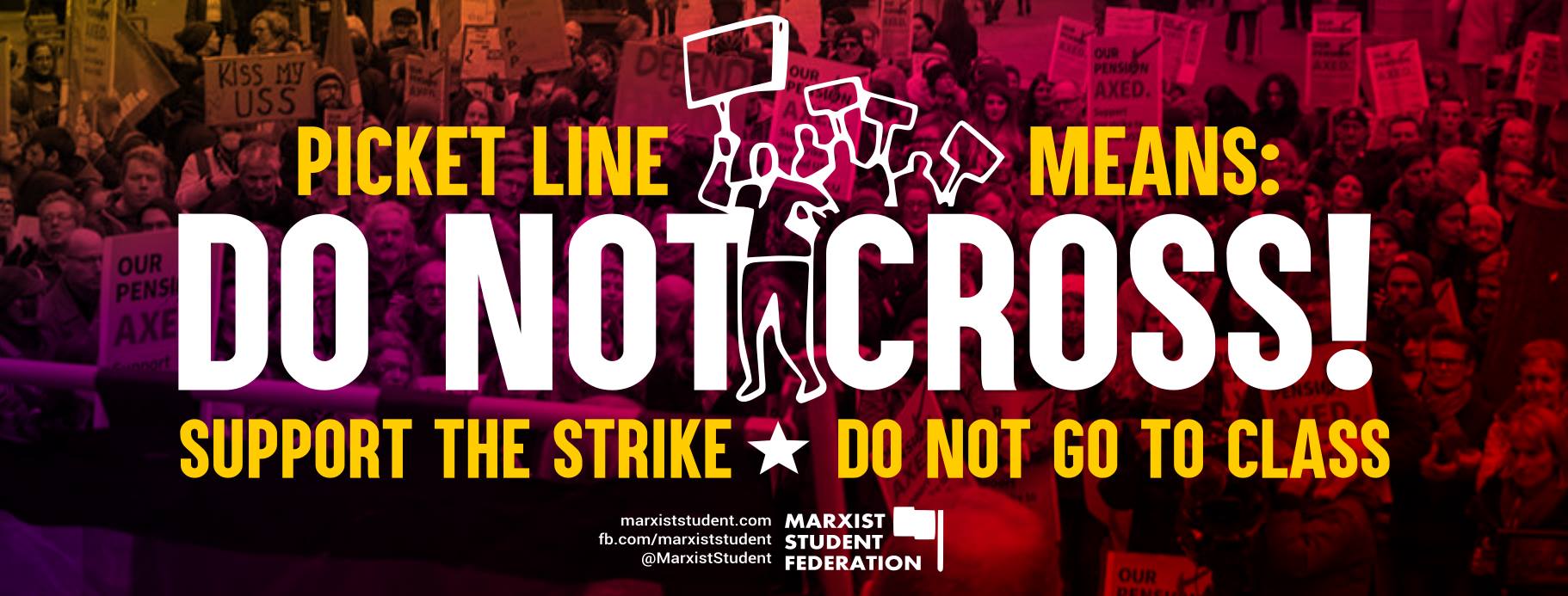
An open letter to the Vice-Chancellor of Liverpool University and President of UUK
By Liverpool Marxists
This open letter was written by students at the University of Liverpool to their Vice-Chancellor, and President of Universities UK, Professor Janet Beer. It has been sent to the Marxist Student Federation, as well as other media outlets, and we are publishing it in its entirety as it shows the real feelings that exist on campus during the time of the UCU strike action.
The letter has been endorsed by the UCU branch at the University of Liverpool.
If you are a student at the University of Liverpool and would like to add your name to this open letter, please get in touch via contact@marxiststudent.com or our Facebook page.
Dear Janet Beer,
We are writing to you in your roles of Vice Chancellor of the University of Liverpool and as President of Universities UK.
Each of the undersigned are students at the University of Liverpool and we felt it is our duty to draw your attention to the genuine feelings which exist on campus, in relation to the strike by lecturers and other non-teaching staff, and to make you aware of some of our experiences of management whilst on the picket lines.
We would like to start by openly stating that we are on the side of the lecturers and other staff in this dispute. We support the striking staff and have been doing what we can to spread solidarity for the action amongst our peers. We will continue to do this in the coming weeks and for as long as it takes to bring UUK back to the negotiating table and to end its attack on pensions. As part of this support we have gone down to the picket lines and stood side by side with our staff during strike days.
It was whilst on the picket lines that we had the pleasure of making the acquaintance of Carol Costello, HR Executive at the University of Liverpool, and Patrick Hackett, your Deputy Vice Chancellor. This is the first time we have met or seen either since studying at the university.
On Thursday, day one of the strike, Carol Costello came down to the picket line at the Foundation Building and was incredibly aggressive and seemed to be trying to intimidate the staff and students who were there. She was far from pleasant to have dealt with and we were incredibly surprised to see a representative of the university speaking with students in such a way.
Sadly, this was not the only time we’ve had such experience of upper management at the university.
On Friday, the second day of the strike action, we were blessed with a visit from Patrick Hackett who was doing the rounds speaking to pickets. At around 8am on the picket line at the entrance to the carpark by Crowne Place, Patrick was asked whether he was surprised by the support that has been shown for the strike. In response he made comments which I think are quite indicative of the attitude that management have towards the lecturers, staff and students at the university. In answer to this question, Patrick started by dismissing the support that lecturers and staff at the university were showing for the strike. He then went on to say that he was surprised at the support which students had shown to the staff. He said this was specially the case since students are “unable to really understand the complicated issue of pensions”. He then went on to imply that the only reason that support was being shown by students was due to the naivety of their youth.
The actions and comments of Patrick Hackett and Carol Costello are insulting and dismissive and they are woefully ignorant of the facts. Students and young people are as capable as any other in looking at the details of the pension dispute. It is our having done so which has brought many of us out on to the picket lines in support of our staff.
The fact that Vice-Chancellors, on six figure salaries with homes provided by the universities, are willing to gamble way the pensions and futures of our lecturers, who have dedicated their lives to teaching, is a damning indictment of the vision that UUK have of education. Whilst lecturers are under attack we, as students, have our own difficulties that we are facing. We are being wracked with massive debts and being forced to live on a pittance whilst we study. We are paying obscene prices to live in university accommodation and many of us have had to take on paid work alongside our studies simply to survive. The amount of stress and anxiety this causes is difficult to quantify at times. And why do we do this to ourselves? We are in education, just like our lecturers and other staff, because we see value in self-development and consider education to be a social good. It is not a commodity which can simply be bought and sold. Lecturers and staff are not just passive cogs in a machine which can be exploited to get more and more profit out of them for the university management.
The future that is being left to us, as a generation, is one of low wages, terrible terms and conditions, massive debts and poor housing options. At the same time as facing these difficulties we are not without hope. The struggle and support of our lecturers and staff inspires us to fight on and to go forward to build a future that we deserve. The strike against attacks on pensions is a symptom of a wider crisis in education and in society. The money exists to settle this dispute, as is evidenced by inflated Vice-Chancellor salaries and the vast quantities of money which exist in the economy which are hoarded by big business and the banking sector. The fight for free education and for a system which is suited to meet the needs of the many is a fight to reclaim this wealth and put to social use.
Standing side by side with our lecturers and other staff in this strike action we do so with all of this in mind and with a view to continue this struggle afterwards so that we can change society for the better.
As students of the University of Liverpool, we, the undersigned, demand the following:
- A public apology from Patrick Hackett, Deputy Vice-Chancellor, for the insulting comments he made towards students on the picket lines on Friday 23 February.
- UUK, of which you are president, should return to the negotiating table with the UCU and earnestly seek to put an end to this dispute. You should reverse the proposed attacks on the USS pension scheme.
The reason we have put these points to you in the form of an open letter is in the hope that our concerns and views are not going to be dismissed as they have been in the past. A number of students at the university have contacted you directly about the dispute, but they are, as of yet, still awaiting any form of response.
We look forward to your reply and to getting back to lectures once you and Universities UK have returned to the negotiating table and have stopped attacking our staff.
Yours Sincerely,
Gilly Singh
John Gillespie
Daniel Harris
Casey Burgess
Heather Macdonald
Charlie Hall
Beatrice Lee
Stephanie McDonagh
Amber Smith
Keir Nicholas-Haizelden
Abi O’Connor
Rebecca Humphrey
Daniel Hauer
Jodie Sylvester
Thomas Richards
Aidan Robinson
Jack Robinson
Elvis Rodrigues
Sam Smith
Jessica McComb
Rebecca Catley
Shivani Anendarajah
Pav Mahal
Anjolee Daudia
Ben Webster
Amy Jarrell
Fiona de Borde
Anagha Jose
Heydi Puertas A.
Eimear McAteer
Benjamin Percival
Yasemin Ahmed
George Wood
Robin Young
Alice Churm
Ceara Thacher
Harry Young
Jenny Goldman
Alice Newnes
Lucy Pilling
Bruce Hodell
Benjamin Warren
Amber Davis
Melissa Spinks
Gethin Watkins
Natalie Harold
Charlotte Price
Lauren Bond
Alice Armstein
Rebecca Brabbins
Jennifer Brown
Vivek Harkini
Will McGowan
Helen Collins

